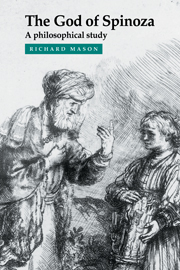6 - The meaning of revelation
Published online by Cambridge University Press: 06 January 2010
Summary
As to your fifth argument (namely, that the prophets made manifest the Word of God in that way), since truth is not contrary to truth it only remains for me to prove … that Scripture, as it stands, is the true revealed Word of God. A mathematically exact proof of this proposition can be attained only by divine revelation. I therefore said, ‘I believe but do not know in a mathematical way, that all things revealed by God to the prophets [as necessary for salvation are set down in the form of law …’]. For I firmly believe, but do not know in a mathematical way, that the prophets were the trusted counsellors and faithful messengers of God.
This comes from a letter of 1665 written in Dutch by Spinoza to Willem van Blijenbergh, a grain broker with an interest in theology. Spinoza tried to prevent the appearance of a Dutch translation of the Theological- Political Treatise, no doubt for reasons connected with what he had said in its Preface: ‘I know how deeply rooted in the mind are the prejudices embraced under the guise of piety. I know, too, that the masses can no more be freed from their superstition than from their fears.’ But a translation appeared anyway. Blijenbergh, in 1674, went on to compose his Truth of the Christian Religion and the Authority of Holy Scripture, Stated Against the Arguments of Ungodliness, or a Refutation of that Blasphemous Book Called Tractatus Theologico-Politicus.
- Type
- Chapter
- Information
- The God of SpinozaA Philosophical Study, pp. 147 - 171Publisher: Cambridge University PressPrint publication year: 1997



